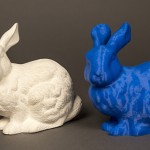
Just two weeks ago we wrote about the Fuel3D, a device for scanning 3D objects so you can replicate them on a 3D printer, with a proposed price tag of around $1,000. Now MakerBot, the leading maker of desktop 3D printers, is launching its own 3D scanner next week, and Signe Brewster at GigaOM is betting it will cost just $500.
That would make it appealing as an accessory for hobbyists who already own the MakerBot Replicator. It’s a low guess, but not unreasonable; since MakerBot today officially merged with the much larger Stratasys, which makes professional-level 3D printers for industrial prototyping, it has a lot of resources to scale the Digitizer up to cheap mass production.
At such prices, we could be about to enter an era that pundits have been wringing their hands about for some time: the age in which it’s possible to rip, mix and print physical objects with the same ease that was once reserved for music and other media. Indeed, US copyright czar Victoria Espinel has warned that it could lead to an increase in counterfeit and pirated goods. Some entrepreneurs seem eager to bring about this future: A company subtly named Pirate3D held a very successful Kickstarter campaign in June for its 3D printer, the equally subtly named The Buccaneer.
Makerbot’s competition, the Fuel 3D, is also a Kickstarter project (and also a very well funded one). The difference between it and the Digitizer is that the Fuel3D is handheld and can hypothetically composite a scan of anything, of any size, located anywhere. The Digitizer may end up cheaper and more user-friendly for MakerBot users, but it’s still limited to smallish objects that you can hoist on to your desk. They join competitors such as the Photon 3D scanner (around $450) and theNextEngine (around $3,000).
Updates on the MakerBot blog have shown a steady progression in the quality of 3D scanned and printed objects since the Digitizer was first announced in late April. The scanner will use a two-laser system to reflect light off objects in order to read their depth, and scans can be modified easily once digitized. MakerBot also claims that the software is great at filling in missing information, and that you can easily scale a design up or down before printing it. This is important, because it means you can turn cat figurines into earrings.

Source: Qz.com